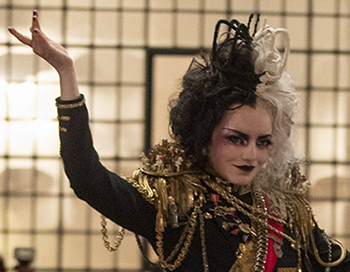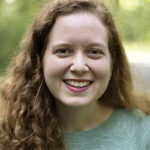Lindsey Weishar: ‘Thou mayest,’ and the necessity of tending to our wounds

"Cruella embraces an identity that denies the goodness within her and damages her relationships with others," writes Lindsey Weishar of the subject of the movie "Cruella," portrayed here by Emma Stone. (CNS photo/Laurie Sparham, Disney Enterprises, Inc.)
My Vocation is Love / Lindsey Weishar
A facet of the 21st century I appreciate is film and literature’s interest in the boundary between good and evil. Though the culture also has huge blind spots when it comes to identifying good and evil, it does well in troubling the idea that a person is either basically a good person and therefore a “good guy” or hero, or pretty much bad and therefore a villain, or at least someone we can easily write off.
The reality is that within us exists the possibility for great goodness and great evil. It is therefore important that we tend to our wounds.
It is said that the hurts we don’t heal from, we pass on to others. More succinctly, hurt people hurt people. This hit home for me in a recent viewing of Craig Gillepsie’s “Cruella,” a 2021 film that gives a backstory to “101 Dalmations” villain, Cruella de Vil.
The film follows a young woman named Estella, who through a series of tragic events — the death of her mother, the discovery that her current employer killed her mother, and that her biological mother is a narcissistic, unfeeling person who wanted Estella killed at birth — comes to identify with revenge and a desire for power and destruction. To counter her pain, she makes an agreement with the lie that extreme behavior is her birthright and therefore her destiny. She renames herself Cruella and embraces an identity that denies the goodness within her and damages her relationships with others.
As she says near the film’s end, “I’m not sweet Estella, try as I might. I never was. I’m Cruella, born brilliant, born bad, and a little bit mad. I’m not like her. I’m better.”
“THE MOST IMPORTANT WORD IN THE WORLD”
The film reminds me a bit of John Steinbeck’s 1951 novel “East of Eden,” which in part follows the family of Adam Trask. His wife Kate leaves the family after birthing twin sons: Caleb and Aron. Kate’s lack of feeling is chilling; she does not seem to care who she hurts. Her abandonment leads Caleb to question whether he has inherited his mother’s nature, whether he is destined to hurt others because of their shared genes.
The linchpin of this novel is the Hebrew word timshel, which translates to “thou mayest.” When God speaks to Cain in Genesis 4:7, he says, “If you act rightly, you will be accepted; but if not, sin lies in wait at the door: its urge is for you, yet you can [thou mayest] rule over it.”
As one of my favorite characters, the philosopher-servant Lee, says of this verse: “‘Thou mayest’ — that gives a choice. It might be the most important word in the world. That says the way is open. That throws it right back on a man. For if ‘Thou mayest’ — it is also true that ‘Thou mayest not.’”
Unlike Estella, who by the film’s end has buried her old self to make way for Cruella, Caleb walks away from an encounter with his mother with the knowledge that though they share many things — blood, tendencies toward hurting others — he is his own person: “I’m my own. I don’t have to be you. . . . If I’m mean, it’s my own mean.”
SEEK OTHERS, CHOOSE THE GOOD
There’s a freedom in this. We, too, can be our own. The road to becoming our own is the acknowledging and tending to our wounds. That often means seeking out others — a good friend, a therapist, a spiritual director, a healing group. And this tending is a lifelong endeavor.
As Caryll Houselander says, “we have an obligation to wrestle unceasingly with ourselves.” It also reminds me that all people are worthy of being known better, and that every person alive still has the opportunity to desire, seek, and ultimately choose the good. Even the most twisted, unfeeling person was not always that way, and maybe they won’t always be that way. I’m left wondering what happens after “101 Dalmations.” Who is Cruella then? Is she ever able to discover in herself the beauty of Estella?
As we navigate a 21st century more alive to the complexity that informs people’s actions and reactions, I hope we also come to better appreciate the mystery of God’s life that dwells in each person. As Lee says in “East of Eden,” “But I have a new love for that glittering instrument, the human soul. It is a lovely and unique thing in the universe. It is always attacked and never destroyed — because ‘Thou mayest.’”
—
LINDSEY WEISHAR is a poet, freelance writer, and native of Champaign who has a master of fine arts in creative writing from the University of Missouri-Kansas City. She is executive assistant to the president at Donnelly College in Kansas City, Kansas. Write to her at lweisharwriting@gmail.com.






